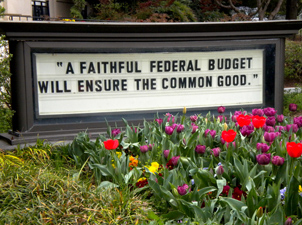
Congress Finally Passes a FY 2018 Budget
NETWORK Government Relations Team
March 22, 2018
At long last, Congress will pass a bipartisan FY 2018 spending bill that will send communities across the country much anticipated resources. This legislation is six months overdue, and Congress should be ashamed. That being said, while it is not perfect, the FY 2018 consolidated appropriations measure contains robust investments in vital safety net programs.
Many of NETWORK’s Mend the Gap issues were among the programs that fared well. The spending measure significantly boosts funding for the 2020 Census, low-income housing, as well as healthcare for seniors, children, and people who are disabled. Investing in safety-net programs is paramount to ensuring the common good.
We are disappointed that Congress did not muster the courage to include a permanent fix for more than 800,000 DACA recipients. That being said, we know the Trump Administration wanted – and failed – to expand their mass deportation agenda. NETWORK continues to support our champions in the House and Senate for their unwavering commitment to protect Dreamers and their families from harmful attempts to tear apart families.
All of us at NETWORK Lobby for Catholic Social Justice look forward to working with Congress throughout the FY 2019 appropriations process to ensure passage of a Faithful Budget. It’s our hope that Congress will turn a new leaf and set aside petty partisanship in order to complete its work on time.
Below is a detailed look at how the omnibus bill affects NETWORK’s Mend the Gap priorities:
Department of Agriculture
- Decreases funding for the Supplemental Nutrition Assistance Program (SNAP) by $4.5 billion primarily due to declining enrollments
Department of Commerce
- Fully funds the 2020 Decennial Census at $2.814 billion, an increase of $1.344 billion above the FY 2017 enacted level
Department of Housing and Urban Development (HUD)
- Increases the HUD budget by $4.6 billion in additional program funding compared to FY 2017, and more than $12 billion above the president’s FY 2018 request
- Renews all Housing Choice Vouchers and provides new vouchers to veterans and people with disabilities—the president’s budget request proposed to eliminate 250,000 Housing Choice Vouchers
- Allocates nearly $1 billion in additional funding to repair and operate public housing
- Boosts funding for the HOME Investment Partnerships program to the highest level in seven years
- Does not include any of the rent increases proposed by the president in his FY 2018 budget request
Department of Health and Human Services (HHS)
- HHS would receive approximately $98.7 billion, an $11.6 billion increase above the FY 2017 enacted level, including $2.6 billion in new funding
- Tweaks Medicare reimbursement status of several prescription drugs
- Increases the Child Care Development Block Grant from $2.9 billion in FY 2017 to $5.2 billion in 2018
- Raises funding for the Low Income Heating Assistance Program by $250 million to $3.6 billion, although the Trump administration requested elimination of the program for the second year in a row
- Fails to stabilize the health insurance market by providing subsidy payments to insurers and allowing states to develop more flexible insurance requirements
Department of Homeland Security
- $1.6 billion as down payment for border wall construction and to make repairs of existing fencing structure
- Scales back on detention beds: includes 40,520 beds with a glide path down to 39,324 by the end of the fiscal year, a decrease of 12,055 from the FY 2017 enacted level.
- Freezes number of ICE agents at FY 2017 level
- Cuts Homeland Security Investigations agents from 150 down to 65
Department of Labor
- Prevents the Trump administration from carrying out a controversial rule that might have resulted in employers of tipped workers restricting how the tips were distributed
- Increases funding for employment and training services to $3.5 billion, compared to $3.3 billion in FY 2017







